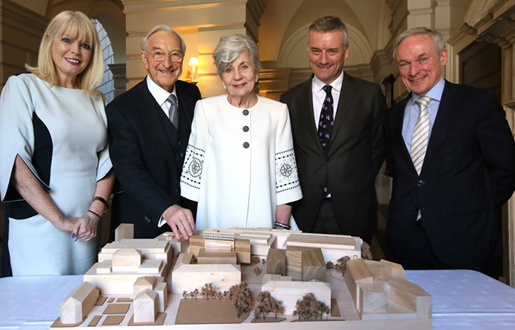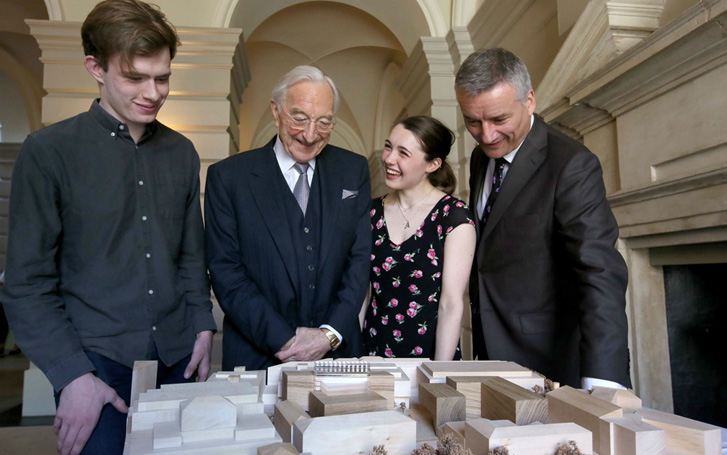Trinity unveils plans for E3 Institute in Engineering, Energy and Environment
May 2018
Plans for the €60 million new E3 Institute to be funded by major Irish philanthropic donation and Government funding
- Single largest donation from Irish philanthropists in the history of the state announced for E3 Institute at Trinity College Dublin
- E3 Institute to provide 1,800 new STEM places for students, addressing skills shortage in Irish economy
- Work to begin on campus in 2018 with completion expected by 2022
College announced plans on 25th May for a €60 million new E3 Institute in Engineering, Energy and Environment that has been made possible with a major private philanthropic donation by the Naughton family through the Naughton Foundation, established by the founder of the Glen Dimplex Group, Dr Martin Naughton, and his wife, Carmel. This will be combined with Government funding from the Department of Education and Skills.
The Naughton family has made the single largest private philanthropic donation in the history of the state to the new E3 institute by donating €25 million. An additional €15 million is being made available by the Department of Education and Skills. This funding will be provided through the Higher Education Authority (HEA).
 In addition to the transformative Naughton gift, significant philanthropic support was also given by Dr Beate Schuler, Dr Paul Johnston with his wife Theresa Johnston, and Mike Peirce.
In addition to the transformative Naughton gift, significant philanthropic support was also given by Dr Beate Schuler, Dr Paul Johnston with his wife Theresa Johnston, and Mike Peirce.
Central to the vision of the E3 Institute is the construction of the Learning Foundry, a state of the art 6,086 square metre facility based on the main Trinity campus which will deliver new teaching facilities and an innovative interactive learning space for undergraduate and postgraduate students. The Schools of Engineering, Computer Science and Statistics, and Natural Sciences will share the new Learning Foundry which will be a launchpad for a new kind of education experience for students with a focus on collaborative and project work. It will have capacity for 1,800 additional places for students of Science, Technology, Engineering and Mathematics (STEM) which constitutes an increase of 50% STEM places over ten years.
The E3 Institute will introduce a new STEM curriculum, involving a seamless integration of teaching, project work and research in new innovative ways for students, graduates and researchers. From first year, students will engage in project based learning, working in teams across the disciplines of engineering, the natural sciences and computing.
Enterprise, creativity, teamwork and critical thinking will be emphasised as part of the overall education experience. New postgraduate courses will be created in the area of six E3 research themes of Cities; Environment; Data; Resources; Production and Well-being.
New interdisciplinary programmes will be developed in areas such as Technology for Change, Smart Cities, Data Science, Sustainable Energy, Climate Change and Sustainable Development, Spatial Data among many others.
Architects, Feilden Clegg Bradley Studios, have been appointed as the lead design team. Work will commence on the new E3 Institute in 2018 and is expected to be complete by 2022.
E3 Location
E3 Institute will be located on the east side of the campus; it will be accessible through gates at the Science Gallery and Lincoln Place Gate. A further entrance will be created with the new Trinity Business School where the new Innovation and Entrepreneurship Hub will also be located
E3 will be the launchpad on the campus for a new kind of education. It will:
- Dramatically increase STEM student numbers by 50% allowing for 1,800 additional places for STEM students.
- This will be made up of 1,152 undergraduate students comprising a 64% increase, and 648 postgraduate students, comprising a 36% increase.
- It will lead to a total of 4,800 students in the three Schools of Engineering, Natural Sciences and Computer Science and Statistics that form part of the E3 Institute.
- Introduce a new STEM curriculum, emphasising enterprise, creativity, teamwork & critical thinking.
- Respond to needs in the knowledge based sectors such as ICT, life sciences (medical technologies), sustainability & engineering (industrial products).
- Develop new interdisciplinary programmes in areas such as Technology for Change; Smart Cities; Data Science; Sustainable Energy; Climate Change and Sustainable Development; Spatial Data analysis and Management; Water and Energy for Developing Countries.
E3 Graduates will take on the following challenges:
- Manufacturing and producing smartly
- Harnessing connectivity in ways that improves society
- Creating technologies and solutions that allow for healthy lives
- Developing better cities
- Sustaining and enhancing natural resources
- Modelling the environment
E3 Research themes:
Cities; Environment; Data; Resources; Production and Well-being.


